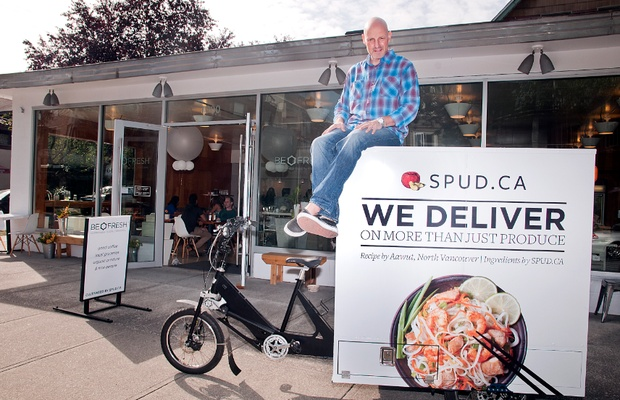Online grocer Sustainable Produce Urban Delivery (Spud.ca) recently opened its first bricks-and-mortar grocery store, making it the latest e-commerce player to acquire a physical dimension along with its virtual presence.
Other Vancouver-based e-commerce ventures such as eyewear seller Clearly.ca and men’s fashion retailer Indochino started exclusively selling online and have since opened stores. Vancouver’s Shoes.com plans to open its first bricks-and-mortar store later this year in Toronto and follow that up with a store on Robson Street early next year, CEO Roger Hardy said last week.
Spud’s 1,250-square-foot store at the corner of West 1st Avenue and Cypress Street is unlike other grocery stores, however, given its relatively small footprint. Most grocery stores tend to be between 15,000 and 20,000 square feet.
Spud encourages customers to buy staples, such as bread and carrots, in the store and then go to an in-store computer terminal to order exotic items, such as rambutans or organic red wine vinegar, for delivery to their home the same day – for free as long as the purchase is made before 11 a.m.
“We’re taking an omni-channel approach,” Spud.ca CEO Peter van Stolk said. “Our competitors can’t do what we’re doing because they would need a bigger footprint. Our model is to have a small real estate presence and leverage our inventory and delivery systems by having people order online.”
Spud.ca’s local inventory passes through its 15,000-square-foot distribution centre on East Hastings Street near Commercial Drive. It also operates a commissary in East Vancouver.
Van Stolk branded the new Kitsilano store Be Fresh Local Market, and he has longer-term plans to open more stores as well as to partner with small mom-and-pop grocery stores by putting computer terminals in their stores.
Those stores would keep their branding but add the words “cultivated by Spud.ca.”
Spud also operates and has distribution centres in Edmonton, Calgary and Victoria. It has a 50% stake in operations in Los Angeles and San Francisco.
“Our current annual run rate for sales is about $60 million,” van Stolk said. “Our goal is to have a $100 million run rate in 16 months.”
Other e-commerce players are also growing quickly.
Hardy said Shoes.com has an annual revenue run rate of $320 million, and he aims to raise that to $1 billion by 2020.
Online suit-seller Indochino does not reveal its revenue, but it has opened a patchwork of bricks-and-mortar stores.
Its most recent opening was in Beverly Hills on August 20 – a launch that brought its store count to seven. The company intends to sign several more leases this year to bring that number to 10. Its other locations are in New York, San Francisco, Philadelphia, Boston, Toronto and Vancouver, where it recently moved its store to Yaletown from Gastown.
Indochino dipped its toe into physical stores in 2011, when it hosted a four-day pop-up store on West Georgia Street in Vancouver. The experiment was so successful that it opened, in various cities, five pop-up stores in 2012, 12 in 2013, and more than two dozen last year.
Clearly.ca’s first physical store opened on Robson Street in 2013 and the company has since opened stores in Kitsilano and Toronto.
Might there be more?
“Possibly,” said Clearly.ca CEO Roy Hessel in May. “Our online business, is the fastest-growing part of our business so that’s where there is the most potential.” •



